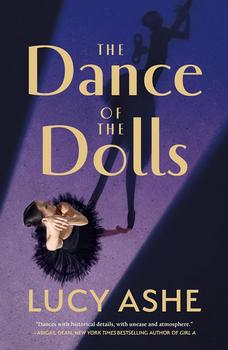Summary | Excerpt | Reading Guide | Reviews | Beyond the Book | Readalikes | Genres & Themes | Author Bio

CHAPTER 2
OLIVIA
I look for luck everywhere. Today, I need to calm my nerves, soothe the anxieties that keep jumping to the front of my mind, refusing to be kept at bay. My porridge stares at me this morning; I can't eat it. It would be unlucky, a curse, to fill my belly with such ordinary, heavy-looking food. Today I need to shine.
We are all superstitious. We thrive on routines and good luck charms. They give us certainty, focus the mind, take us to a magical place where we can leave the real world and become the dancing apparitions the audience want us to be. We need our muse, our Terpsichore, to lead us onto the stage. Changing our names was the first step. Clara and I used to be plain old Olivia and Clara Smith. But we changed it to Marionetta when we left ballet school and ascended to the ranks of the company, joining Miss de Valois at her brand-new Vic-Wells ballet company, rebranding ourselves to match. It was our mother's idea to take her name, Marion, and weave it into something better than Smith. Clara was reluctant, but I persuaded her that Mother needed this, some recognition of the role she had played in getting us this far.
At Sadler's Wells Theatre, the home to our Vic-Wells Ballet, we have a specific dwelling for our superstition: an old monastic well that lurks in the center of a dark and shadowy storage room underneath the auditorium. We traipse down there when we need luck, our visits punctuating the rhythm of our lives. Each day starts with morning ballet class, those essential ninety minutes that keep our bodies supple and strong. No one is allowed to miss class, though the principal dancers often do, somehow avoiding Miss de Valois's disapproval. If we have time, we hide ourselves in the gloom of the well room for a few minutes before afternoon rehearsals, finding a dark spot to massage our feet. We visit it before performances, at least three shows a week in the October to May season now that our company's reputation is growing. And then finally, if there is no post-show party to dress for in a mad, ecstatic rush, we reach down and dip our fingers into the well before we go home to sleep, to recover. My sister will always choose the party, while I prefer the quiet of home. I like to rest my aching limbs for the next day's work.
I spend longer than usual at the well this morning. There is a cool darkness to the room, lit faintly by a single light that hangs beneath green enamel and wire frame from the low ceiling. The well sits in the center, a stone rectangle three feet wide and rising a couple of feet off the ground. I like to sit on the stone edging, my feet pressed into the cool stone wall. Toward the corners of the room, four steel beams rise up from the concrete floor, giving the room a cramped tightness. If there are more than a few of us down here at once, it is easy to bump into something, or even someone, lurking quietly in the privacy of the shadows. The old stone well cover rests against the side wall of the room, a dust sheet draped over the curious carvings that I like to run my finger along when I have the room to myself. It has a long history, dating back to when a monastery must have stood on the site, perhaps as far back as the twelfth century, surrounded by fields and gardens. It is hard to imagine now, with the New River closed over and buildings springing up all over Islington. Our theatre is number five of all the Sadler's Wells that have drawn the London audiences. Miss Moreton, in the rare moments we can distract her from her relentless pace through class, tells us about the theatre, how when Richard Sadler built the first one back in the seventeenth century, he made it popular by playing on this watery attraction. The wells were closed over, but the superstitions remained. We have gladly rebirthed them, all of us dancers ready to pounce on the first sign of magic and mystery.
Excerpted from The Dance of the Dolls by Lucy Ashe. Copyright © 2023 by Lucy Ashe. Excerpted by permission of Union Square & Co. All rights reserved. No part of this excerpt may be reproduced or reprinted without permission in writing from the publisher.




Read the best books first...
Click Here to find out who said this, as well as discovering other famous literary quotes!
Your guide toexceptional books
BookBrowse seeks out and recommends the best in contemporary fiction and nonfiction—books that not only engage and entertain but also deepen our understanding of ourselves and the world around us.